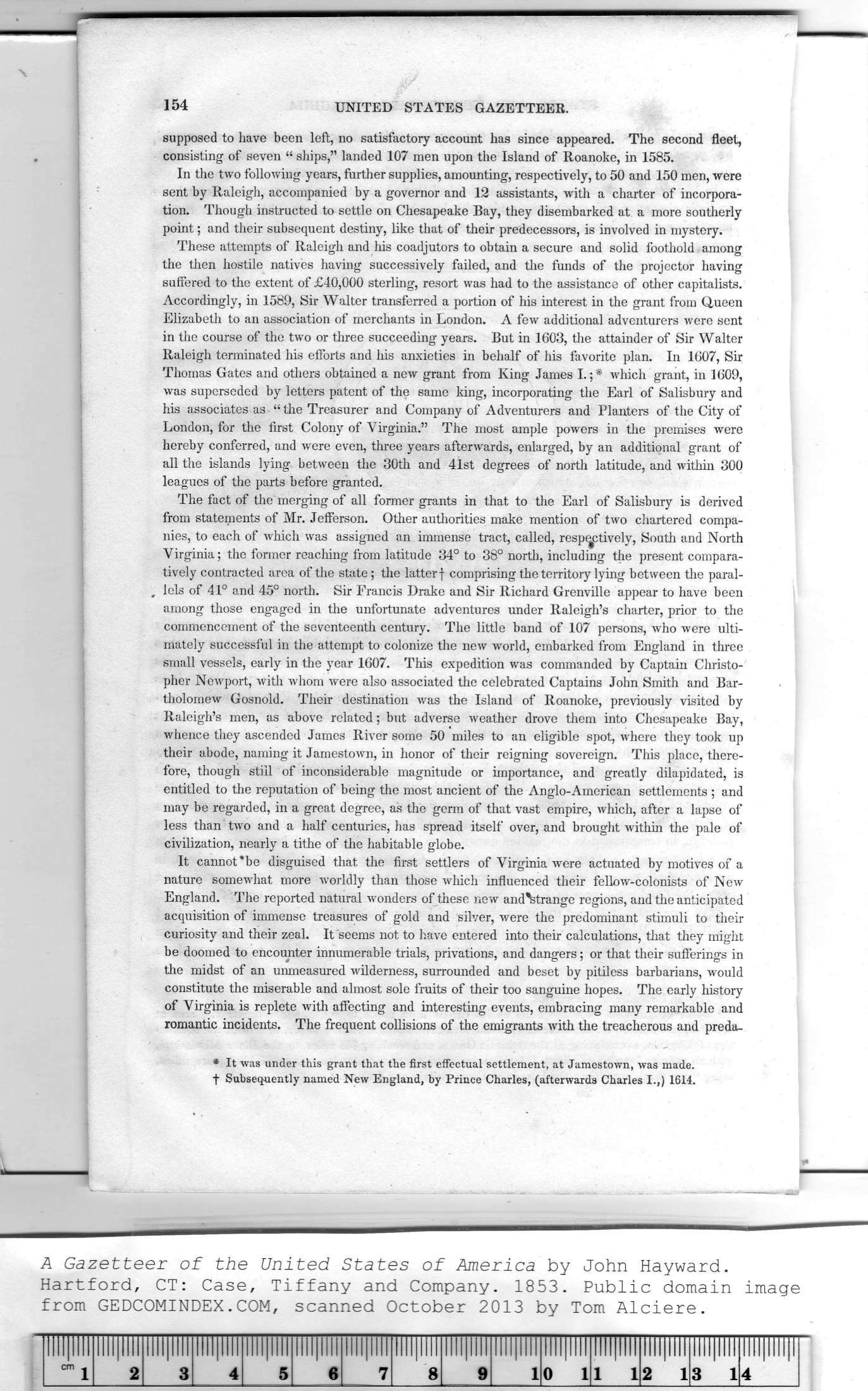|
|
Note: Ctrl and + increases the font size of the text below, Ctrl and - decreases it, and Ctrl and 0 resets it to default size.
154 UNITED STATES GAZETTEEE.
supposed to have been left, no satisfactory account has since appeared. The second fleet,
consisting of seven “ ships," landed 107 men upon the Island of Roanoke, in 1585.
In the two following years, further supplies, amounting, respectively, to 50 and 150 men, were
sent by Raleigh, accompanied by a governor and 12 assistants, with a charter of incorpora-
tion. Though instructed to settle on Chesapeake Bay, they disembarked at a more southerly
point; and their subsequent destiny, like that of their predecessors, is involved in mystery.
These attempts of Raleigh and his coadjutors to obtain a secure and solid foothold among
the then hostile natives having successively failed, and the funds of the projector having
suffered to the extent of £40,000 sterling, resort was had to the assistance of other capitalists.
Accordingly, in 1589, Sir Walter transferred a portion of his interest in the grant from Queen
Elizabeth to an association of merchants in London. A few additional adventurers were sent
in the course of the two or three succeeding years. But in 1603, the attainder of Sir Walter
Raleigh terminated his efforts and his anxieties in behalf of his favorite plan. In 1607, Sir
Thomas Gates and others obtained a new grant from King James I. which grant, in 1609,
was superseded by letters patent of the same king, incorporating the Earl of Salisbury and
his associates as “the Treasurer and Company of Adventurers and Planters of the City of
London, for the first Colony of Virginia." The most ample powers in the premises were
hereby conferred, and were even, three years afterwards, enlarged, by an additional grant of
all the islands lying between the 30th and 41st degrees of north latitude, and within 300
leagues of the parts before granted.
The fact of the merging of all former grants in that to the Earl of Salisbury is derived
from statements of Mr. Jefferson. Other authorities make mention of two chartered compa-
nies, to each of which was assigned an immense tract, called, respectively, South and North
Virginia; the former reaching from latitude 34° to 38° north, including the present compara-
tively contracted area of the state; the latter f comprising the territory lying between the paral-
, lels of 41° and 45° north. Sir Francis Drake and Sir Richard Grenville appear to have been
among those engaged in the unfortunate adventures under Raleigh's charter, prior to the
commencement of the seventeenth century. The little band of 107 persons, who were ulti-
mately successful in the attempt to colonize the new world, embarked from England in three
small vessels, early in the year 1607. This expedition was commanded by Captain Christo-
pher Newport, with whom were also associated the celebrated Captains John Smith and Bar-
tholomew Gosnold. Their destination was the Island of Roanoke, previously visited by
Raleigh's men, as above related; but adverse weather drove them into Chesapeake Bay,
whence they ascended James River some 50 miles to an eligible spot, where they took up
their abode, naming it Jamestown, in honor of their reigning sovereign. This place, there-
fore, though still of inconsiderable magnitude or importance, and greatly dilapidated, is
entitled to the reputation of being the most ancient of the Anglo-American settlements; and
may be regarded, in a great degree, as the germ of that vast empire, which, after a lapse of
less than two and a half centuries, has spread itself over, and brought within the pale of
civilization, nearly a tithe of the habitable globe.
It cannot'be disguised that the first settlers of Virginia were actuated by motives of a
nature somewhat more worldly than those which influenced their fellow-colonists of New
England. The reported natural wonders of these new and'strange regions, and the anticipated
acquisition of immense treasures of gold and silver, were the predominant stimuli to their
curiosity and their zeal. It seems not to have entered into their calculations, that they might
be doomed to encounter innumerable trials, privations, and dangers ; or that their sufferings in
the midst of an unmeasured wilderness, surrounded and beset by pitiless barbarians, would
constitute the miserable and almost sole fruits of their too sanguine hopes. The early history
of Virginia is replete with affecting and interesting events, embracing many remarkable and
romantic incidents. The frequent collisions of the emigrants with the treacherous and preda-
A Gazetteer of the United States of America by John Hayward.
Hartford, CT: Case, Tiffany and Company. 1853. Public domain image
|
